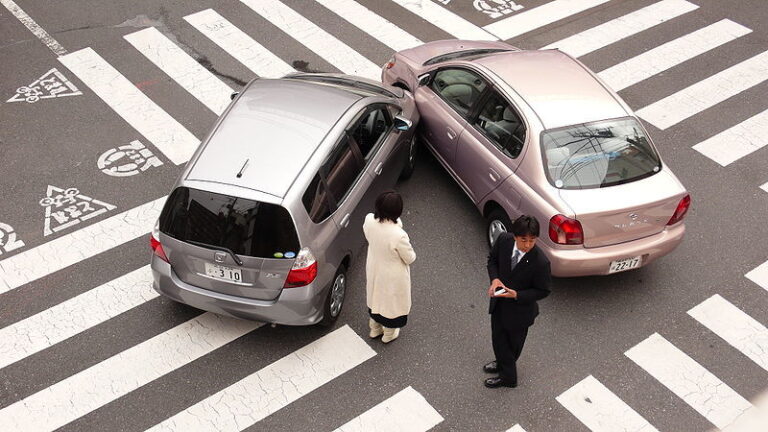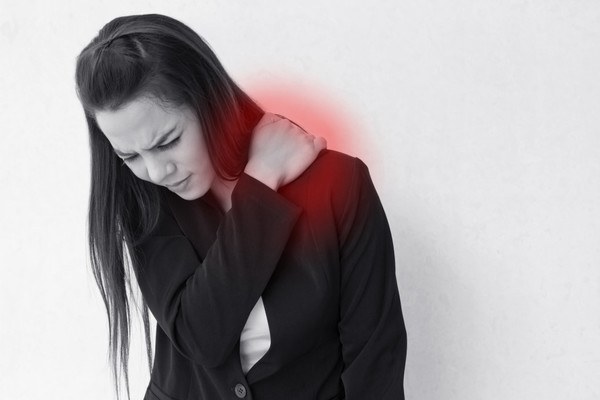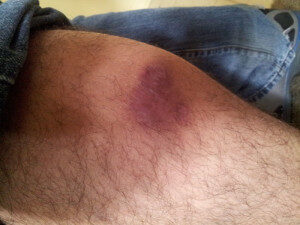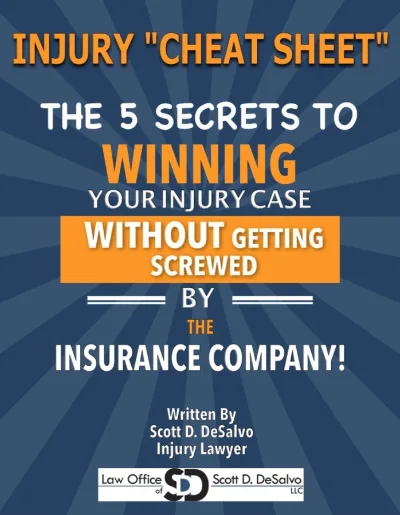
In the shock and confusion immediately after a car accident, you may not realize that you're injured.
Some post car accident symptoms can take days or even weeks to recognize. This article tells you about car accident symptoms that are common after a car accident.
Want to know the value of your car accident case? Check out my car accident settlement calculator below.
Even if you feel okay in the minutes and hours after an accident, it's important to know what symptoms to look for.
Keep reading for 10 post car accident symptoms to watch out for.

Headaches are one of the most common post-car accident symptoms. You may not experience pain or discomfort right away, but wake up the next morning, days, or weeks later.
You may experience headaches because of vision issues or any number of other causes after an accident.
It could be as benign as a tension headache or from something as serious as a
traumatic brain injury.
There are many reasons for headaches after a car accident:
Dealing with the aftermath of a car accident can be frustrating. You have insurance claims to file, car repairs to arrange, extra expenses to cover, medical symptoms to deal with. There's a lot going on and for that reason, it's not unusual for people to get tension headaches after a car accident.
A concussion can be very serious and needs a healthcare professional's attention.
There will most likely be other symptoms that stem from a concussion such as:
Concussions can cause chronic symptoms and long-term effects.
Whiplash can exhibit many of the same symptoms as a concussion.
The sudden jarring force of the impact can stretch the muscles and tendons in and around your neck.
Ligaments, joints, nerves, and discs are often injured during accidents. All can cause intense pain afterward. You may feel fine until you use your arms or move around in everyday life.
Some other whiplash symptoms to watch out for include:
Whiplash often takes a while to diagnose, and it's important to be aware of any post-car accident symptoms that could be from whiplash.
Post-traumatic stress disorder is not just suffered by soldiers. Any traumatic event can lead to long-term symptoms.
You don't have to be physically injured or even a participant in the accident to experience post-traumatic stress as a result of it.
Witnesses, first responders, family members, and others are also affected.
Some signs of post-traumatic stress disorder are:
A persistent headache needs a medical professional to diagnose the cause. They will also be able to provide pain management options.


Neck and shoulder pain after car accidents can be for several reasons:
Shoulder and neck pain are common post-car accident symptoms related to whiplash, concussion, and other serious things you shouldn't ignore. Even a slight spark of pain - similar to that feeling of when you wake up in pain because you haven’t slept in your favourite crib sheets - should not be ignored.
Loved ones may notice these symptoms before you realize them yourself. Mood and behavior changes can indicate a concussion, post-traumatic stress, depression, and anxiety disorders, and more.
Irritability, emotional mood swings, and becoming withdrawn may be signs of unresolved issues around the accident.
Seeking help and support from loved ones or a counselor can be beneficial as you recover from the accident and its physical, emotional, and financial aftermath.
Lack of appetite isn't unusual when dealing with post-car accident symptoms. This may be due to stress, an upset stomach, concussion, depression, or other reasons.
If you're concerned about your decreased appetite, it may be wise to consult with a health or nutrition professional. They can give you tips and suggestions on how to get your eating back on track.
Emotional or stress eating may also be a response to the stress of a car accident. Seek support from friends, family, or a counselor to help cope with the emotions you are struggling with.
Difficulty sleeping may be a result of other symptoms interfering with your ability to get to sleep or stay in a sound slumber. Pain, nightmares, and stress can all affect your ability to fall or stay asleep.
Experiencing tingling or numbness in your neck, shoulder, extremities or back may be a symptom of nerve or tissue damage.
A pinched nerve can be very painful and will require medical intervention to properly treat. Physiotherapy, TENS machines, nerve blocks, and other treatments have been effective for many but can lead to long-term difficulties in some cases.
Abdominal pain may be the result of internal bruising or more serious internal bleeding or injury.
Seatbelts pull tight across the abdomen when a car accident occurs. This can lead to tenderness and pain that may not be fully felt until days later.
Nausea is a symptom that may be from stress or a sign of injury.

Bruises don't always show immediately. It can take a few days before the blood from a broken vessel seeps to your skin surface.
You can bruise or injure internal organs, tissue, and bones that may lead to delayed visible bruising on the skin surface.
Most contusions are not a major concern, but if the bruising, discoloration, and tenderness continue, you should seek medical consultation to find out the cause.

Swelling and stiffness are common symptoms after a motor vehicle accident. It may take a few hours or even days before you feel the full effect of an injury.
As sprains, pulled muscles and damaged tissue tried to heal it will often swell. This swelling can add to stiffness and reduce your range of motion for the affected area.
If you experience swelling around joints some steps to treat it include:
After trying all of these, if you still experience swelling and stiffness you may require medical attention or physical therapy to get your range of motion back.
Double vision, blurred vision, and dizziness experienced in the hours, weeks, or days after an accident are noteworthy post-car accident symptoms. This could be because of a concussion, post-traumatic stress, whiplash or another underlying issue.
These issues may resolve themselves with time or require medical testing to determine the cause and treat the illness or condition responsible.

Ringing in the ears or tinnitus can be an annoying issue that many have to deal with as a post-car accident symptom.
It may be from the loud noise of the impact, shock, concussion, or stress. This may be a symptom that you have to wait out as there are limits to effective treatments for tinnitus.
It's always wise to get a healthcare professional's opinion and advice if you are experiencing changes in hearing or tinnitus post car accident.
Back pain can be debilitating and unfortunately can come out of nowhere as a post-car accident symptom. It may be muscle tightness or bruising if the pain is aching and generalized discomfort.
If shooting pain travels down the spine or extremities, it could be from damaged or pinched nerves.
Sciatica pain begins in the lower back usually and will travel down the leg. It may be a constant ache or shooting pain.
Pain management, physio, and other interventions may be necessary to treat acute or chronic back pain after a car accident.

Lack of concentration and memory loss can be from head injuries, concussions, stress, and more.
You may find it hard to carry on a conversation or finish simple tasks. Your memory may also be due to stress, pain, or other mental and physical health complications.
Traumatic head injuries and stress can lead to difficulty forming thoughts or expressing yourself. While it may be just that you have a million things on your mind and can't think about all of them at once, you should seek medical help if your symptoms are interfering with activities of daily living.
Post-concussion syndrome can last for months or even years, leaving the individual with difficulty speaking, critical thinking, or recalling information.

An injury can disrupt your life, but you don’t have to face the legal battle alone. At the Law Office of Scott D. DeSalvo, we fight for injured victims, helping them secure the compensation they need to recover. Whether you’ve been hurt in a car accident, slip and fall, work injury, or truck accident, we’re here to stand up for your rights.
Don’t let insurance companies take advantage of you. Contact us today for a free consultation—no fees unless we win your case. Let’s get you the justice you deserve!
Would you like to know more about car accident injury symptoms to watch for? Click here!
If you or a loved one is dealing with a situation like this, give us a call any time, day or night. We are here to help. 312-500-4500


Scott DeSalvo founded DeSalvo Law to help injured people throughout Chicago and surrounding suburbs. Licensed to practice law in Illinois since 1998, IARDC #6244452, Scott has represented over 3,000 clients in personal injury, workers compensation, and accident cases.
No Fee Unless You Win | Free Consultation | 24/7 Availability Call or Text: (312) 500-4500
>>Read More
Main Office:
1000 Jorie Blvd Ste 204
Oak Brook, IL 60523
New Cases: 312-500-4500
Office: 312-895-0545
Fax: 866-629-1817
service@desalvolaw.com
Chicago and Other Suburban Offices
By Appointment Only